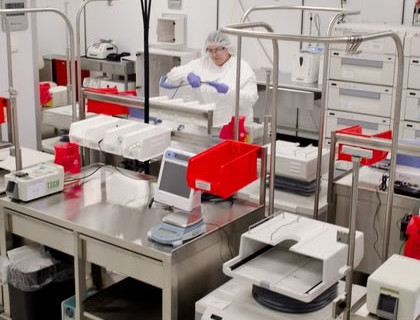
Aastrom CEO Discusses How Recent Acquisition Strengthens Current Manufacturing Capability and Clinical Pipeline
In late April, it was announced that Aastrom had acquired Sanofi’s Cell Therapy and Regenerative Medicine business including the global commercial rights to three Cell Therapy products – Carticel, MACI and Epicel. Carticel is an autologous chondrocyte implant for treatment of articular cartilage defects. MACI is also an autologous chondrocyte implant marketed in the EU. Epicel is a skin replacement therapy designed for burns greater than or equal to 30% of total body surface area. The acquisition will cost Aastrom $6.5 million and is expected closed in less than a month.
In March 2013, and shortly after Aastrom’s CEO and President Nick Colangelo joined, Aastrom announced that they would begin laying off half its workforce and cutting operating expenses by half. They also halted the late-stage clinical trial of their Cell Therapy product (ixmyelocel-T) for treatment of critical limb ischemia. The trial was stopped due to low enrollment, having only enrolled 40 patients, when the study goal was 594 patients. At the time, Colangelo stated that Aastrom would switch their focus to their Cell Therapy product for dilated cardiomyopathy.
Last week, I had the opportunity to ask Aastrom’s CEO and President, Nick Colangelo some questions about the acquisition, Aastrom’s clinical pipeline and plans for the future, which I have included below.
1. How does this acquisition impact Aastrom’s existing clinical pipeline?
Nick Colangelo: The acquisition brings Aastrom global manufacturing, marketing and sales capabilities as well as revenue, all of which will help support our future development plans for our lead product candidate, ixmyelocel-T and for new therapies we might target.
2. It seems there has been a great deal of progress since last year when Aastrom halted the late-stage trial for ixmyelocel-T to its current position and this acquisition. How have you executed the transition?
Nick Colangelo: In the last year, Aastrom has continued the ongoing effort to establish a broader product portfolio. We have been especially focused on completing enrollment in the Phase 2b study of ixmyelocel-T in advanced heart failure due to ischemic dilated cardiomyopathy. We also announced the first results from our joint clinical study with the University of Michigan to evaluate the use of ixmyelocel-T in treating patients with craniofacial defects. We also took steps to strengthen our financial position. The Sanofi Cell Therapy and Regenerative Medicine (CTRM) business acquisition is a reflection of our efforts to expand our focus as we continue to advance the development programs for ixmyelocel-T.
3. How is Aastrom’s clinical program progressing? Can you give us a status update on ixCELL DCM and REVIVE? How will the new acquisition complement these programs?
Nick Colangelo: Enrollment in the ixCELL-DCM clinical trial has accelerated as a result of implementing a number of strategic initiatives to drive enrollment and rapid execution of this study. More than 30 clinical trial sites are active in the U.S. and Canada and enrollment is expected to be completed in the second half of 2014.
Since the clinical study of ixmyelocel-T in critical limb ischemia stopped enrolling patients in 2013, we have been progressing towards completing the study. Approximately 40 patients were enrolled and we should have top line safety and efficacy data from this study later in 2014.
4. What do you think are the biggest challenges in taking a stem Cell Therapy from concept to commercialization?
Nick Colangelo: One challenge in developing a Cell Therapy is meeting the need for quick and reliable access to high quality human tissues for research. Aastrom recently launched a bone marrow collection center in San Diego to address this challenge. It is a source of high quality bone marrow for both our own research and development purposes and also for others in the biopharmaceutical industry. This is an exciting new development that we expect to meet the needs of Aastrom and companies around the globe developing new treatments to meet important medical needs.
5. How has the Aastrom R&D team changed in the past year?
Nick Colangelo: Recently Aastrom appointed Ross Tubo, PhD, as chief scientific officer and David Recker, MD, FACR, FACP, as chief medical officer of Aastrom. Dr. Tubo is a recognized pioneer in the development and registration of cell therapies and Dr. Recker has played a lead role in multiple successful global regulatory filings. This new team will play a key role in significantly advancing our goal of building a renowned research and development leadership team in Cell Therapy and regenerative medicine and maximizing our opportunities with ixmyelocel-T.